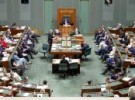It is easy to criticise federal parliamentarians as they do get things wrong, especially when they allow their personal ideologies to override the wishes of those they represent and when they place party and personal interests above the public interest.
Fortunately for all Australians very few MPs have an ethical compass pointing in the wrong direction.
But is there too strong a tendency to focus almost exclusively on what voters perceive as problems?
Do we too often use throw away lines such as all MPs are "only in it for themselves" and if we do, is this an easy, perhaps even lazy mantra?
Would any of us like people to believe we think and act the same as everyone in our workplaces, sporting groups, clubs or friendship circles?
I feel confident in saying, no we would not, so perhaps we should not do this when referring to members of parliament be they the prime minister, ministers, senior opposition figures or backbenchers.
With the new year approaching it may be a good time to reflect on the past 12 months and acknowledge the positives that have been achieved by MPs rather than seeing only negatives.
Prime Minister Albanese has been criticised, sometimes severely, for the number of overseas trips he has taken. But is the criticism justified?
Australia is part of what is now a "globalised world".
There are many international forums where, for the good of the country, it is imperative that our prime minister attend. Imagine the "pile on" that would have occurred if he refused to go to these forums or rejected invitations from world leaders to visit their countries.
It is obvious that these trips have resulted in the Prime Minister gaining the respect of many world leaders and in restoring constructive relationships with some; while at the same time making it clear that he will always put Australian interests first.
A small sample of other achievements by the government, accomplished with the support of other parliamentarians follows.
The cost of child care has been reduced as has the cost of some essential medicines.
Other positives include the introduction of free fee-paying courses for over 200,000 TAFE students, which will serve to upskill the Australian workforce.
Access to Medicare Care Clinics have been increased, especially in areas of greatest need. To assist in the cost of health care, there has been a tripling of bulk-billing incentives for GPs, designed to assist over 11 million Australians.
A focus on "Made in Australia" has been revived through the recently legislated National Reconstruction Fund, an initiative that has the potential to improve the lives of millions of Australians.
Progress has been made on Australia's shift to increasing reliability on renewable energy. Some parliamentarians warn that the rate of progress is too slow. But governments cannot shut down traditional sources of energy almost immediately.
Other considerations need to be factored into this policy area, as moving quickly to close down businesses that contribute many billions of dollars to the Australian economy could result in a severe recession. The lives of individuals, families and communities would be devastated and that devastation could result in serious consequences for a considerable number of Australians.
It is stating the obvious to say that there are also very severe consequences for all Australians if we do not reduce our reliance on fossil fuels.
The extremely difficult challenge for all parliamentarians is to find a suitable short-term balance.
The difficulty in doing so needs to be acknowledged.
To address the trust deficit between MPs and the general public, is it time for those who only criticise to pause and reflect on the very difficult job the majority of MPs undertake and to acknowledge that they often do it well?
We have a lot to be grateful for in Australia and that extends to our political system, which includes Parliament and the MPs who serve within it. They pass many laws that impact on Australian lives in positive ways.
Australians should also be grateful for the way in which the overwhelming majority of parliamentarians respect the institutions that form the foundation of our democratic system.
For anyone doubting this, perhaps they could look at a great number of other countries, some that lay claim to being a functioning democracy, to see how fortunate we are.
Next time we are tempted to just criticise MPs it might be wise to ask - hands up anyone who has not made an unwise decision, and/or has ignored wise advice which led them down an unplanned path and resulted in less-than-ideal outcomes.
I would suggest that most of us have.
But we learn valuable lessons from our mistakes, recover from them and go on to make better decisions.
So, should Australians who vote MPs into power occasionally thank them for their often-tireless efforts on the country's behalf?
Would doing so help to build a more trusting relationship between MPs and other Australians?





















 Toi Staff
Toi Staff Gideon Levy
Gideon Levy Belen Fernandez
Belen Fernandez Rami G Khouri
Rami G Khouri Donald Low
Donald Low Mort Laitner
Mort Laitner Ali Fathollah-Nejad
Ali Fathollah-Nejad Nikkei Editorial
Nikkei Editorial Michael Kwet
Michael Kwet
